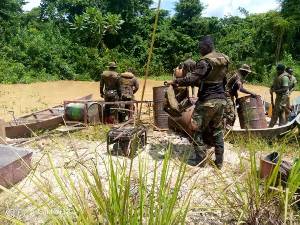Ghana Armed Forces' 'Operation Halt' Partners with Small-Scale Miners to Combat River Mining
In a groundbreaking move, the Ghana Armed Forces' 'Operation Halt' has formed an unlikely alliance with small-scale miners to combat illegal mining in river bodies. This collaborative effort aims to protect Ghana's water resources and environment.
_Background_
Illegal mining, particularly in river bodies, has devastated Ghana's ecosystem, causing deforestation, water pollution, and loss of biodiversity. The government launched 'Operation Halt' to combat this menace, deploying military personnel to affected areas.
_New Approach_
Recognizing the limitations of military action alone, 'Operation Halt' has engaged small-scale miners in a bid to find sustainable solutions. The partnership seeks to:
1. Educate miners on environmental impact
2. Provide alternative livelihoods
3. Encourage responsible mining practices
SMALL-SCALE MINERS' PERSPECTIVE
"We acknowledge the harm caused by our activities and are willing to adapt," said Kwame Owusu, a small-scale miner. "We want to work with the military to find ways to mine responsibly."
MILITARY'S ROLE
"The military's primary objective remains to protect the environment and enforce the law," stated Colonel Nicholas Nii Addo, Operation Halt's Commander. "Collaborating with small-scale miners allows us to address the root causes of illegal mining."
_SUCCESS STORIES_
Initial results from the partnership are encouraging:
1. Over 100 small-scale miners have surrendered their equipment
2. Alternative livelihood programs have been established
3. River pollution has decreased significantly
_CHALLENGES AHEAD_
Despite progress, challenges persist:
1. Limited resources for alternative livelihoods
2. Resistance from rogue miners
3. Need for sustained community engagement
_CONCLUSION_
The Ghana Armed Forces' partnership with small-scale miners marks a significant shift in the fight against illegal mining. By working together, they can:
1. Protect Ghana's environment
2. Promote sustainable mining practices
3. Empower communities
As 'Operation Halt' continues, its success will depend on sustained commitment from all stakeholders. This innovative approach serves as a model for addressing environmental challenges in Ghana and beyond.
_Key Statistics:_
- Over 1,000 river bodies affected by illegal mining
- 50% reduction in river pollution since Operation Halt's inception
- 500 small-scale miners engaged in alternative livelihood programs
Operation Halt's next steps are crucial in combating illegal mining and timber exploitation in Ghana. To achieve its objectives, the operation will likely focus on:
- *Sustained Enforcement*: Continuing to remove illegal miners and equipment from water bodies and forest reserves, as seen in Operation Halt II, which was launched in April 2021 ¹.
- *Community Engagement*: Collaborating with local communities to promote sustainable livelihoods and educate them on the environmental impact of illegal mining ¹.
- *Alternative Livelihood Programs*: Establishing programs to provide alternative sources of income for small-scale miners, reducing their reliance on illegal mining ¹.
- *Expanded Scope*: Potentially expanding its focus to address the illegal exploitation of other natural resources, such as timber, in regions like Brong-Ahafo and the Western Region ².
- *Interagency Cooperation*: Strengthening partnerships with government agencies, civil society organizations, and traditional authorities to ensure a coordinated approach to addressing illegal mining ³.
By taking these steps, Operation Halt can build on its progress and make a lasting impact on Ghana's environmental sustainability and natural resource management.




No comments yet
Be the first to share your thoughts!